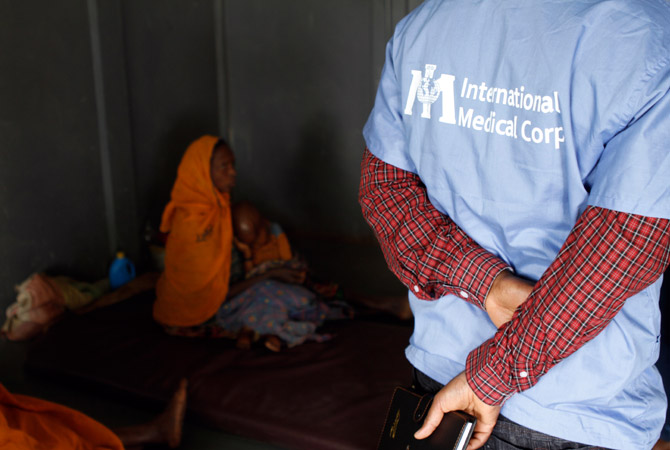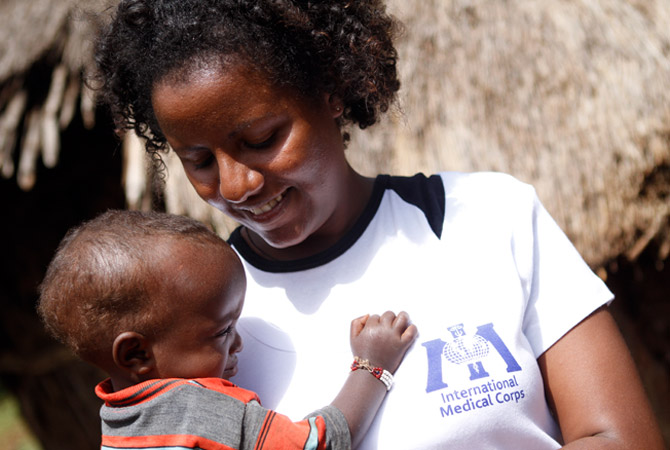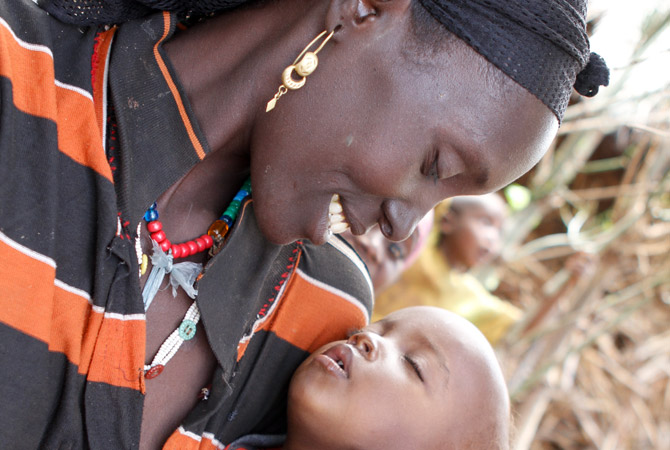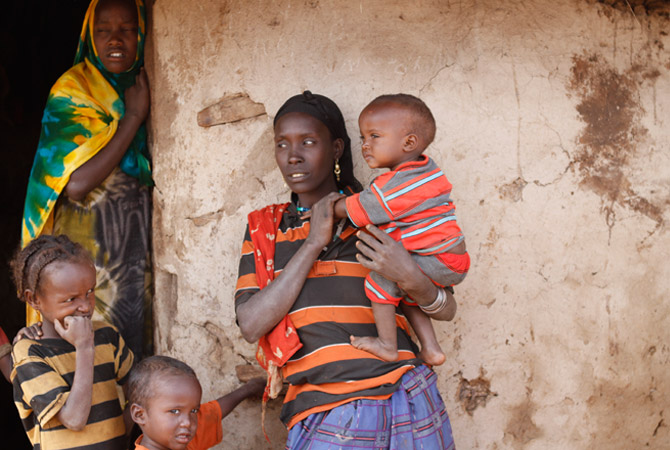In Ethiopia, International Medical Corps is assisting the Ministry of Health in providing nutrition services in primary health care facilities. Children between the ages of 6-59 months (up to 5 years), who are the most vulnerable, are screened to assess their nutritional status. If they are found to be severely acutely malnourished and do not have additional medical conditions, they are enrolled in the outpatient therapeutic program. Children come to the health facility on a weekly basis, where they are weighed and measured, undergo a full medical evaluation and receive ready-to-use-therapeutic foods (RUTF) as well as necessary medications. This RUTF is made from peanuts and contains all the energy, minerals and vitamins children need. The average length of treatment for full recovery is 6-8 weeks. Malnutrition is caused by many underlying factors including unhealthy hygiene and sanitation practices, poor breastfeeding and weaning practices and an undiversified diet. Health extension workers, trained by International Medical Corps, are providing comprehensive nutrition and health education to caretakers to foster long-term behavioral change. In addition, we are using Mother Care Groups to spread knowledge of healthy nutrition practices from mother-to-mother.
For many people living in the resource-poor communities we serve around the world, knowledge of healthy nutrition practices is as vital to the health status of their families as access to sufficient food sources. Although in emergencies, International Medical Corps can and often has quickly mobilized to establish nutrition programs and deliver nutrition-dense foods to treat severe and moderate acute malnutrition, our more than 25 years of experience has taught us that simultaneously working on prevention and education is critical to achieving long-term nutritional health.
The hallmark of our mission has always been to train and provide knowledge to the populations we work with so they can become self-reliant, caring for their families and communities and continuing to thrive once assistance has ended. On a recent trip to East Hararghe, Ethiopia, I saw first-hand how much a successful nutrition response depends on health education and supporting behavioral change. International Medical Corps’ team in this region showed me how they are helping one mother restore the nutritional health of her baby boy and imparting life-long skills so she can take charge of her entire family’s health.
A mother of seven whose primary source of income is crops grown on the family farm, Khatidja, couldn’t hold back a smile as she bounced her baby boy on her hip and recounted how in just three weeks he had gone from listless, weak and malnourished, to bright-eyed and energetic. Concerned that her youngest wasn’t gaining weight and getting progressively weaker, Khatidja brought him to an International Medical Corps-supported health center in the region. Her baby was enrolled into the outpatient therapeutic program (OTP) – an 8-week intervention that includes the provision of specially formulated ready-to-use therapeutic food (RUTF) to treat severe acute malnutrition and nutrition education for caregivers to maintain long-term success. After their condition improves, children are then referred to a supplementary feeding program where other foods are introduced to stabilize a malnourished child’s health. In OTP, Khatidja was given RUTF to rapidly and safely increase her baby’s weight. She was also assigned a Health Extension Worker (HEW) named Miskiy, a local community member trained in healthy nutrition practices by International Medical Corps. HEWs like Miskiy are able to provide culturally appropriate and up-to-date information on healthy nutrition practices in the local dialect to parents in their communities.


Khatidja fed her baby boy the RUTF and noticed he quickly began to respond. She also returned for weekly weigh-ins and medical checkups and worked with Miskiy to address some of the reasons her youngest child, as well as the rest of her children, were not at their healthiest. Miskiy stressed the importance of breastfeeding her baby and preparing healthy meals in the home for all her children. She also taught Khatidja the importance of hand washing before meal preparation and boiling water collected from local ponds for drinking. The family previously drank contaminated, brown, murky water directly from these sources, as clean drinking water is scarce in the drought-prone region. Drinking contaminated water leads to diarrheal diseases that can cause dehydration, malnutrition, even death if not treated quickly.

Miskiy also addressed a few cultural feeding practices that Khatidja – as well as many families throughout the region – followed and that prevented her family from achieving a healthy nutritional status. One is the practice of serving only one or two inexpensive crops grown at home to children, as opposed to a variety of foods, as well as milk, meat or other nutrient-rich foods that are more expensive. Khatidja’s family had access to these foods but sold them at market for income. By teaching Khatidja the importance of providing a variety of foods for a balanced diet and creating a plan whereby she and her husband could afford to cut back on the amount of meat and milk they sell at market, Miskiy was able to give Khatidja the knowledge and tools to help her family long-term. “International Medical Corps’ training program has taught me so much about nutrition,” said Miskiy. “Now I’m motivated to help my own community.”
With her six other children gathered around her on the family’s farm, Khatidja lifted her baby to look into his eyes and told me, “He’s so much healthier now. Now he plays with his brothers and sisters. He didn’t do that before. And that makes me really happy.”
International Medical Corps runs nutrition and food security programs in some of the world’s most food-stressed areas, including Ethiopia, Pakistan, Burundi, Afghanistan, Somalia, Chad, and Sudan. Our nutrition programs have a 90 percent success rate, meaning that almost all the malnourished children who come through our programs recover. In all of International Medical Corps’ programs, we address nutrition at every contact point we have with community members from nutrition education in water and sanitation projects and growth monitoring and nutrition screening in primary health care, to provision of therapeutic nutrition care.
